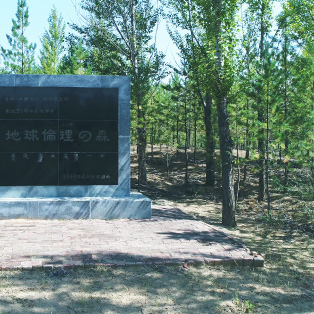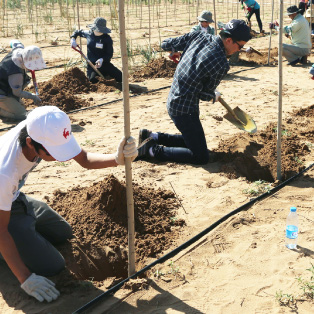Earth RINRI Promotion Activities
RINRI Institute of Ethics advocates and promotes “Earth RINRI” , and undertakes projects worldwide with the ultimate goal of ensuring peace and security on Earth.
“RINRI” is a “way of living” that we ought to follow as human beings. Not only is this a way to be followed for human beings, but also for all living things, non-living things, and natural life forms, thus making Earth RINRI an overall term for all the above. It is RINRI of, by, and for the people of the Earth, with the ultimate goal of ensuring peace and security on Earth.- Takeaki Maruyama (RINRI Institute of Ethics Second Chairman) advocated Earth RINRI in 1985.
He proposed the following “10 acts to save the Earth” as a way for us to take practical action in our daily lives with gratitude to Earth.




garbage home





pollute water

“Earth RINRI” has been a focus of research at the RINRI Institute of Ethics for many years and have been developed upon the foundation of “RINRI” for its practice and growth. “Earth RINRI” calls for a global perspective that is not just a way of life to be lived among human beings but one that transcends into a global RINRI that incorporates the practice of environmental conservation. At the RINRI Institute of Ethics, we undertake various projects in order to promote “Earth RINRI” as such.
“Earth RINRI Forest” Creation
What can we do to preserve a rich “Earth filled with Green” for our future generation- As a first step towards meeting this purpose, RINRI Institute of Ethics launched a new project called the “Earth RINRI Forest” marking the Institution's 55th Founding Anniversary. Under the support of the Japan Association for Greening Deserts, we started sending Desert Greening teams to plant trees in the Kubuqi Desert in Inner Mongolia, China in April 1999.
There have already been over 2,000 volunteers participating in the Desert Greening project, and the number of trees planted have exceeded 320,000. Poplar saplings that had no leaves before have now grown into beautiful trees with many green leaves.
As we continue with the Kubuqi Desert Greening Project, in 2015, we also started a new greening project in Ulan Buh Desert located in Bayannur City of Inner Mongolia Autonomous Region, about 300km west of the Kubuqi Desert.

Greening project in the Kubuqi Desert

Greening project in Ulan Buh Desert
Earth RINRI Promotion Award
Every year, we reward groups and individuals both nationally and internationally that have drastically contributed to the promotion of Earth RINRI in the fields of Environment, Education, Culture, and Medicine. This award was established in 1998, and since the 11th Awarding Ceremony (2008), a new section was created to make one section for rewarding “National Activities" and another for “International Activities” . 46 groups have been rewarded until today.
Maruyama Scholarship
Maruyama Scholarship was founded in 2000 for international students and young researchers pursuing studies in “the Research of Japan” . It is intended to promote friendship and exchange of the spiritual cultures between Japan and other countries in Asia.
We have supported international students from China, Korea, Taiwan, Israel, Singapore, Philippines, Cambodia, and Malaysia in the past. Scholarship students' past research covers a broad range of topics such as: “Strategies for Efficiency Improvement of Japanese Education” , “RINRI” Philosophy and Economic Development amongst the 3 Nations- Japan, China, and Korea” , “Public Interest and Corporate RINRI of Japanese Companies” , “The Symbolic and Artistic Role of Mirrors in Japanese Paintings” , “Research on Modern Women's History of Japan” , “Research on the Judicial System of Japan and the World” .
Through this scholarship, international students and scholars are given the opportunity to contribute to Japan and their home countries in the fields of academic research, education, and the arts, becoming bridges for cultural exchange.

